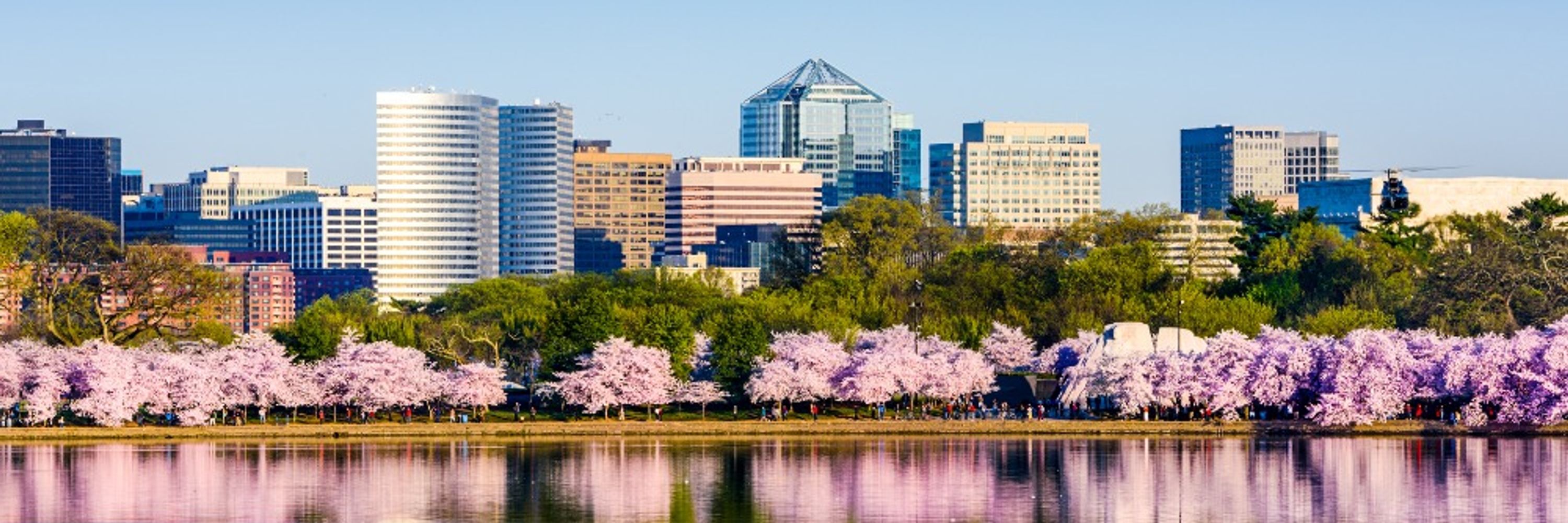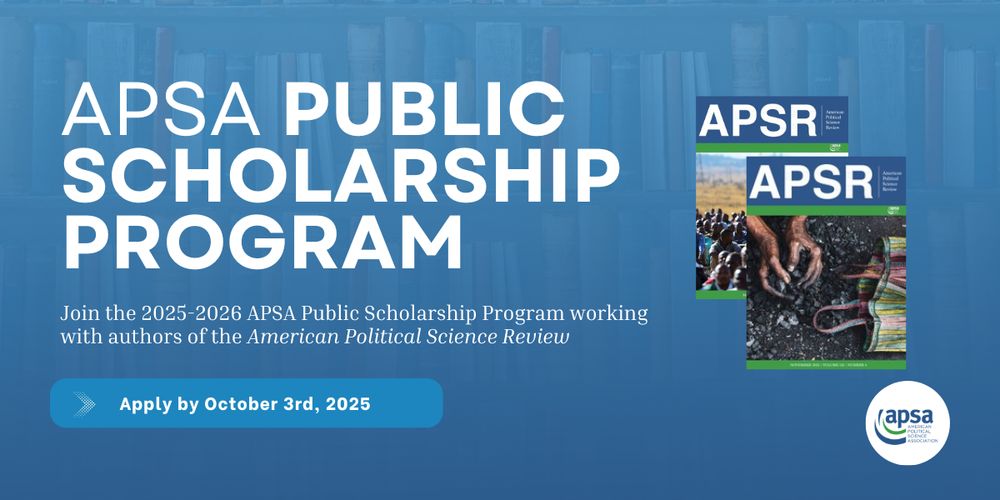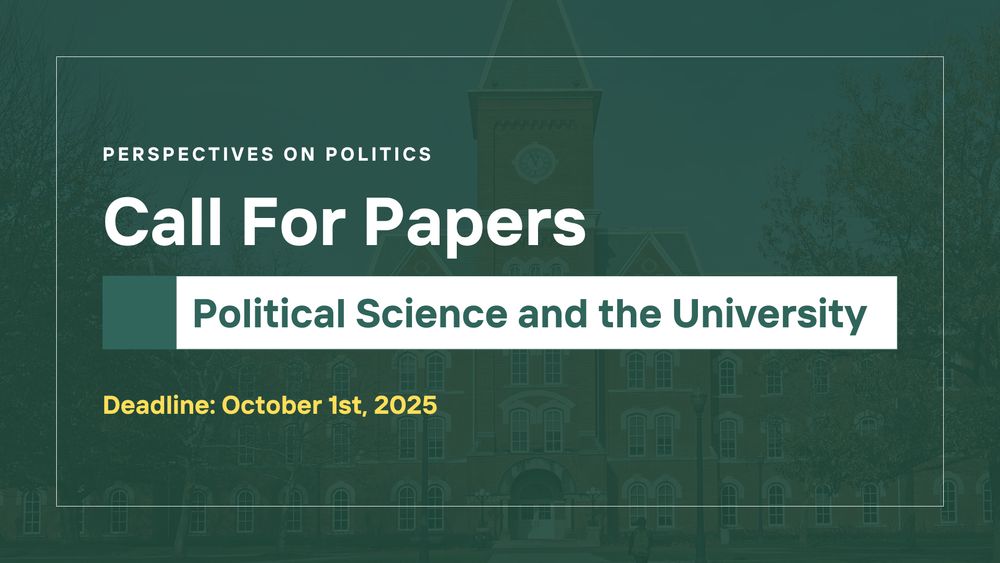APSA
@apsa.bsky.social
6.5K followers
50 following
1K posts
The American Political Science Association (APSA) is the leading professional organization for the study of political science.
www.apsanet.org
Posts
Media
Videos
Starter Packs
Pinned
APSA
@apsa.bsky.social
· 11h

Meet the 2025 APSA Fund for Latino Scholarship Recipients
The APSA Fund for Latino Scholarship’s primary goal is to encourage and support the recruitment, retention, and promotion of political science students and scholars who study and research Latina/o politics (especially students and tenure track junior faculty). Grants for the 2025 cycle were made to those individuals whose purposes most clearly match the goals of the Fund, and whose proposals most persuasively demonstrate capacity for successful completion.
politicalsciencenow.com
APSA
@apsa.bsky.social
· 13h
Teaching American Politics in Times of Uncertainty: A Resource Collection
By Michelle D. Deardorff, University of Tennessee at Chattanooga and Allison Rank, University of Northern Iowa In late July, twelve political science educators gathered online to reflect on the challenge of teaching introductory American government courses at a time when trust in institutions is eroding, students’ habits around reading and participation are shifting, and faculty face new state mandates on required texts and assessments.
politicalsciencenow.com
APSA
@apsa.bsky.social
· 16h
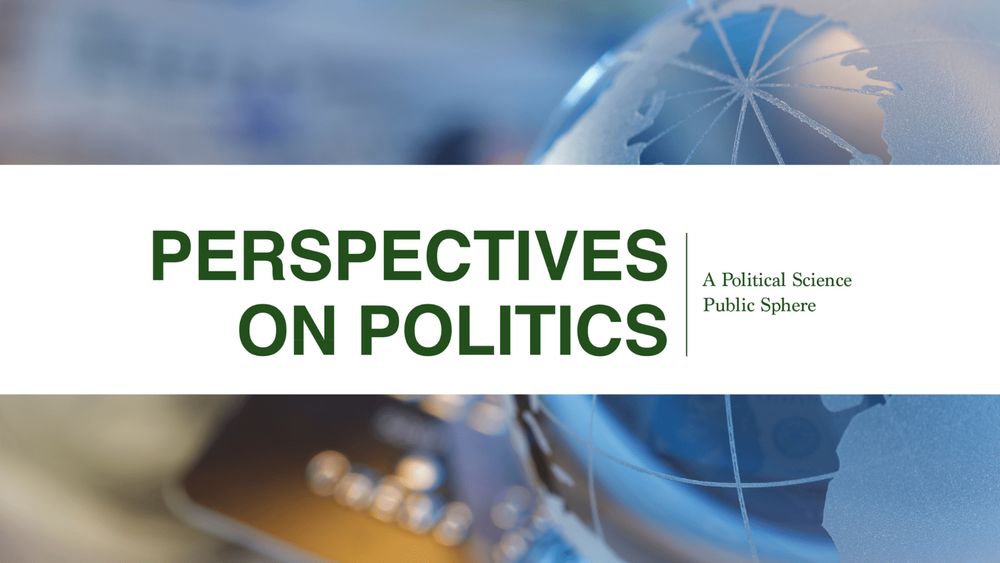
Citizens’ Preferences for Multidimensional Representation
Citizens’ Preferences for Multidimensional Representation By Jack Blumenau, University College London, Fabio Wolkenstein, and Christopher Wratil, University of Vienna How do citizens want to be represented in politics? We investigate citizens’ multidimensional preferences regarding six conceptions of representation that are derived from political theory. Using original item batteries and a conjoint experiment, we elicit the relative importance of the dimensions and the types of representation people prefer on each dimension.
politicalsciencenow.com
APSA
@apsa.bsky.social
· 1d

Reflections on Civically-Engaged Research at the 2025 APSA Annual Meeting in Vancouver
The 121st APSA Annual Meeting & Exhibition, “Reimagining Politics, Power, and Peoplehood in Crisis Times,” was held September 11–14, 2025, in Vancouver, British Columbia, Canada. This year, over 5,000 political scientists, scholars, and experts, along with more than 300 online participants, came together to share ideas, research, and innovations in the field. The meeting provided a vibrant space for advancing Civically-Engaged Research (CER) and highlighted the growing impact of community-centered approaches in political science.
politicalsciencenow.com
APSA
@apsa.bsky.social
· 1d

Political Science as a Dependent Variable: The National Science Foundation and the Shaping of a Discipline
Political Science as a Dependent Variable: The National Science Foundation and the Shaping of a Discipline By Tamir Moustafa, Simon Fraser University From 1965 to 2020, the National Science Foundation constituted the single largest funding source for political science research. As such, the NSF played a central role in defining the cutting-edge of our discipline. This study draws on historical records of the American Political Science Association to examine the political and administrative contexts that shaped the funding priorities of the NSF Political Science Program.
politicalsciencenow.com
APSA
@apsa.bsky.social
· 2d
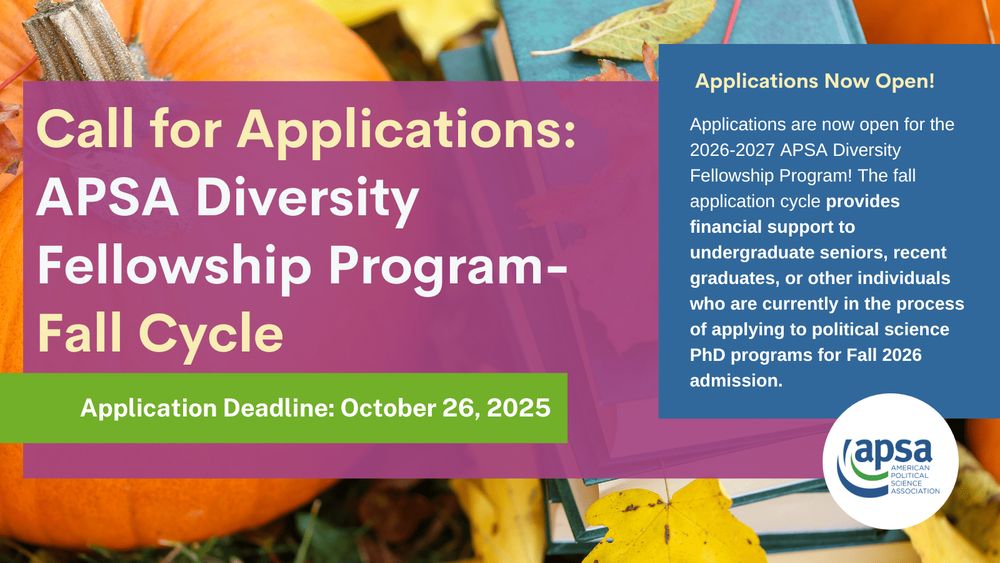
Call for Applications: APSA Diversity Fellowship Program – Fall Cycle
Applications are now open for the 2026-2027 APSA Diversity Fellowship Program! The fall application cycle provides financial support to undergraduate seniors, recent graduates, or other individuals who are currently in the process of applying to political science PhD programs for Fall 2026 admission. Fellows will receive $5000, disbursed over two years. Applications are due on October 26, 2025. Completed applications will include:
politicalsciencenow.com
APSA
@apsa.bsky.social
· 2d

Varieties of State-Building: Ecology, Clientelism, and Bureaucratic Rule in Chile
Varieties of State-Building: Ecology, Clientelism, and Bureaucratic Rule in Chile By Maximiliano Véjares, Johns Hopkins University Current research suggests that all states share a perpetual appetite for extraction and standardization. However, this research overlooks the fact that subnational regions present different appeals and challenges to ruling coalitions. While states seek to extend bureaucratic rule over peripheries with valuable assets and favorable geography, they might instead seek to preserve local patrimonial bastions when those areas offer substantial electoral support.
politicalsciencenow.com
APSA
@apsa.bsky.social
· 5d

LGBTQ+ Victimization by Extremist Organizations: Charting a New Path for Research
LGBTQ+ Victimization by Extremist Organizations: Charting a New Path for Research By Jared R. Dmello, The University of Adelaide, Mia Bloom and Sophia Moskalenko, Georgia State University Anti-LGBTQ+ narratives are deployed by extremist groups with contrasting ideologies, from Jihadis to right-wing extremists and QAnon to Incels (involuntary celibates). Using these different movements as case studies, this article highlights the convergence of ideologically conflicting extremist organizations around antiqueer sentiment.
politicalsciencenow.com
APSA
@apsa.bsky.social
· 6d

Call for Applications: 2025-2026 Public Scholarship Program | Deadline: September 20 -
APSA is accepting applications to join the seventh cohort of the Public Scholarship Program fellows. This program offers remote part-time fellowships that introduces graduate students to the…
buff.ly
Reposted by APSA
APSA
@apsa.bsky.social
· 16d

Constitutions, Trade Liberalization, and the Sugar Industries in the US and Japan
In the APSA Public Scholarship Program, graduate students in political science produce summaries of new research in the American Political Science Review. This piece, written by Sienna Nordquist, covers the new article by In Song Kim, Megumi Naoi, and Tomoya Sasaki, "Domestic Institutions, Geographic Concentration, and Agricultural Liberalization". With the Trump administration announcing new verbal trade deals on an almost daily basis, the flow of goods and services across borders is on everyone’s mind.
politicalsciencenow.com
APSA
@apsa.bsky.social
· 6d

Multidimensional Diversity and Research Impact in Political Science: What 50 Years of Bibliometric Data Tell Us
Multidimensional Diversity and Research Impact in Political Science: What 50 Years of Bibliometric Data Tell Us By Yuner Zhu, Hong Kong Baptist University and Edmund W. Cheng, City University of Hong Kong We examine the changing patterns of knowledge production and diffusion in political science over the past five decades using a dataset of over 200,000 SSCI-indexed research articles from 1970 to 2020.
politicalsciencenow.com
APSA
@apsa.bsky.social
· 7d

A Global Ranking of Research Productivity of Political Science Departments
A Global Ranking of Research Productivity of Political Science Departments By Joan Barceló, Christopher Paik, Peter van der Windt and Haoyu Zhai, New York University Abu Dhabi This article provides a global ranking of research productivity of political science departments. We collected data on 115,427 articles and 12,696 books—written in both English and other languages—from 5,586 faculty members in 178 departments in North America, Europe, Asia, Latin America, Oceania, and Africa.
politicalsciencenow.com
APSA
@apsa.bsky.social
· 8d

Manifesting a Shift in the “Overton Window”: The Threat of Project 2025 on the LGBTQ+ Community in Higher Education
Manifesting a Shift in the “Overton Window”: The Threat of Project 2025 on the LGBTQ+ Community in Higher Education By Athena M. King, Old Dominion University and Sara Sanatkar Since the first Trump administration, historically marginalized groups in the United States have been subjected to greater instances of bigotry and discrimination due to conservative influence on sociopolitical institutions. These actions suggest a shift in the “Overton Window,” whereby policy preferences previously deemed “unacceptable” are given consideration in the mainstream, especially by conservative policy actors.
politicalsciencenow.com
APSA
@apsa.bsky.social
· 9d
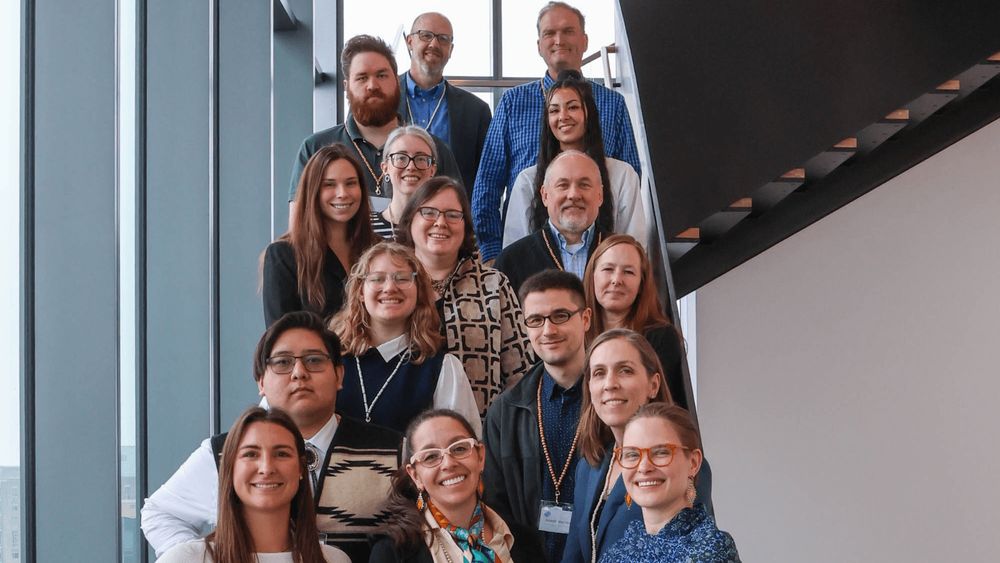
Future Generations at the Forefront: Building Community in Indigenous Political Science
A new workshop creates space for mentorship, scholarship, and visibility for emerging voices in Indigenous politics. On April 2, 2025, doctoral students, faculty mentors, and senior scholars convened in the David Rubenstein Forum at the University of Chicago for the inaugural Future Generations in Indigenous Political Science Research Workshop. The full-day event was a first-of-its-kind gathering in the discipline: a structured, intentional space focused on research and professional development for scholars studying Indigenous politics.
politicalsciencenow.com
APSA
@apsa.bsky.social
· 9d
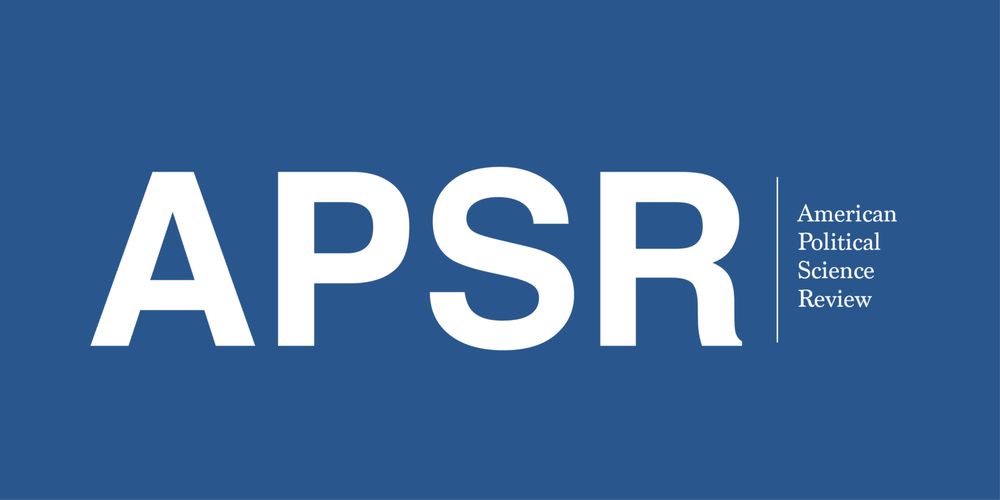
A Turn Against Empire: Benito Juárez’s Liberal Rejoinder to the French Intervention in Mexico
A Turn Against Empire: Benito Juárez’s Liberal Rejoinder to the French Intervention in Mexico By Tom Long, University of Warwick and Carsten-Andreas Schulz, University of Cambridge In the mid-nineteenth century—even as many European liberals took a “turn to empire”—Mexican President Benito Juárez and his supporters enunciated an anti-imperial, liberal vision for international politics. In the context of the French intervention, Mexican liberals rejected claims that Europe’s material progress conferred upon the continent a “civilizing mission” vis-à-vis the rest of the world.
politicalsciencenow.com
